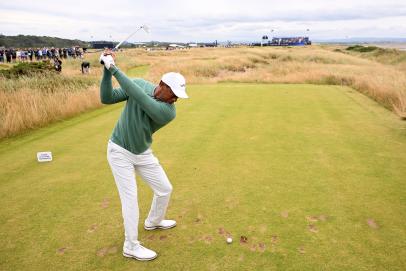British Open 2024: Fancy an unexpected expected pick to win at Troon? You’ve come to the right place – Australian Golf Digest

- by Admin
- July 17, 2024

I swear the British Open, that original of major tournaments, exists to remind us that as much as we strive for order, and, well, the logical, we cannot have it. Golf, like life, is almost never what you expect it to be.
Especially elite golf, in this day and age, cannot be planned for in any real way, other than to know that what you don’t know will only be your undoing if you continue to rail against its inconsiderate unpredictability. The game of life, if we are to call it that, isn’t about collecting wins as much as it is taking quiet comfort in the unexpected. Being disappointed, yes, but not being disappointed in being disappointed.
This is, of course, how we have to think about golf (the experience, the business, the game), which to the uninitiated seems intent on declaring winners when what it mostly does is agglomerate tales of survival. With the rarest of exceptions, golf’s champions find a trophy in their hands not through straight lines and slide-rule calculations but via raw attrition, blind guile and demon bounces.
And the demonest of bounces must surely be The Open, an event where the weather always tends to be a bigger pre-game story than any competitor and most of the bunkers should be surrounded by caution tape and chalk outlines of those left as collateral damage. That’s decidedly the case this year at Royal Troon, where the golf this week hopefully will be illogical and whimsical, terrifying and comic, sweet and gut-wrenching, like an old-time Disney musical if it were scripted by Stanley Kubrick.
More From British Open Coverage Ranking The Field British Open 2024: Power rankings for the entire field at Royal Troon  Voices British Open 2024: Tiger Woods fired back at Colin Montgomerie, but Monty knows the truth
Voices British Open 2024: Tiger Woods fired back at Colin Montgomerie, but Monty knows the truth  British Open Preview The 2016 Open at Royal Troon: Best Duel Ever!
British Open Preview The 2016 Open at Royal Troon: Best Duel Ever!
Nevertheless, you have to believe in impossible good fortune because that’s what it is to love golf, particularly major championship golf. At least that’s the viewpoint I take, especially as one whose record is so glaringly deficient in the business of predicting the champions of majors. Oh, I’ve been accidentally right a couple of times, but I wouldn’t encourage any wagering. To say this space is not exactly a gambling tout is like saying top-level college athletics in the U.S. isn’t exactly about higher education or a steady diet of mac and cheese probably isn’t going to reduce your cholesterol. I am wrong mostly when it comes to predicting major championships because I rely on an insanely meaningless calculus that is determined the way a 2-year-old decides what toy will be played with next. Just like him or her, my logic is well-constructed until it folds in on itself like a black hole swallowing a third moon.
Mostly though, I am awash and exhilarated by what the Troon locals are forecasting as the “unsettled conditions” set for this week. “Unsettled conditions,” a reference to weather that in all other parts of the world would be known as “cataclysm,” is one of those lovely British turns of phrases like “can’t be arsed.” (For those not in the know, “can’t be arsed” I believe is how Tiger Woods responded to the multiple requests for him to serve as U.S. Ryder Cup captain at Bethpage Black in 2025.) Of course, “unsettled conditions” also is what happens after my dog eats deep-dish pizza. Equally, it serves as a reasonable description of what might be the general mood surrounding the delay after a husband fails to immediately respond to the question, “Do I look fat in this?”
Thankfully, The Open is promising us some of the aforementioned U.C. in the early stretches of this year’s event. This is code for competitive chaos, where rather than the bravest heroes, the top of the leaderboard seems as likely to include some bloke with a hyphenated surname from Nether Wallop or a teaching pro from the Outer Hebrides wearing a barely fastened BetFred patch on his left sweater sleeve.
That’s what makes The Open about as delightful as afternoon tea at The Lanesborough and as unpredictable as the onset of poison sumac. What you have to love most about The Open at Troon is that it includes a 123-yard par 3 that seems as unplayable today as it was in the 1920s. According to Golf Digest Architecture Editor Derek Duncan’s research, the Postage Stamp eighth is the venue’s most interesting hole and was once described by a local writer as “the worst hole I ever saw,” with a green “the shape of a dining room table and ridiculously small.” In that most Scottish of epithets, it was called the “pocket handkerchief,” which we now know as guttural slang for “ninnyhammer,” “chucklehead” or “ratbag.”

David Cannon/R&A via Getty Images
The beauty and beastliness of Troon is that it features such a tiny menace mixed in with 600-yard par 5s and 500-yard par 4s. It seemingly requires any kind of player to win, whether it be the smashing Swede Henrik Stenson in 2016 or the tidy grinder Justin Leonard in 1997. So, whom to call on this go-round? Nothing but a simple bit of number crunching. Which I think is what Bryson DeChambeau says about his driver design philosophy. Or was that his thoughts on the number of protein shakes per day? No matter. My method is its own kind of irregular science, which is what I employ to deal with the aftermath of my pizza-eating dog.
To begin uncovering this year’s champion, I took a look at the last seven Open winners dating back to the last visit to Troon and documented their ranking in four statistical categories: driving accuracy, greens in regulation, scrambling and putting average. As it played out, every winner ranked in the top 25 in greens, scrambling and putting, while the performances in fairways hit seemed all over the lot, ranging from first and fifth (Harman, Stenson) to 59th and 74th (Spieth, Molinari). So I tossed out fairways hit. Even with reports of a wet summer and thick rough, I’m going to stick with history. The British slang equivalent of this phrase I believe is “a load of tosh,” but I might not have that right.
So the average rank of the Champion Golfer of the Year for each of the remaining three categories that week was seventh (GIR), fourth (scrambling) and sixth (putting). Next, I looked at the players currently ranked in those positions on each of the three top tours in the game today—PGA Tour, DP World Tour and LIV. (It pains me to give LIV any measure of respect, given its primary funding, but I’m willing to embrace the inequity of the current golf reality, which is reminiscent of most scenes in “The War of the Roses”.)
That left me with nine players, but only six of those players were in the field this week: Christian Bezuidenhout, Tommy Fleetwood, Rasmus Højgaard, Adrian Meronk, Jon Rahm and Scottie Scheffler. Unfortunately, there is no good or obvious way to break a tie between a guy with an “ø” in his name and a guy who “plays” for a “team” named in honor of crossing the Rubicon. So I did the next best logical thing: I looked at the average best finish of the last seven players to win the Open before they won the Open. That ranged from top-five finishes from Stenson and Spieth to a 20th by Cameron Smith. The average of the group was eighth. So the player whose best prior finish in the Open was eighth must surely be my choice this year. That player was Scheffler.

Keyur Khamar
So in an event whose very foundation lies in unpredictability, vagary and the buffeting of capricious winds from all corners, I have gone and chosen the most predictable of winners, the sturdiest of characters (footwork notwithstanding, of course), the most vanilla of superheroes the game has ever seen. He is that great leveling force, a Ward Cleaver in a sea of Logan Roys, that makes sense of a game that is as logically illogical as low-fat ice cream and well, almond “milk.” But that is golf, as mixed up as it is, especially so this week. Let Scheffler restore order at Troon. Let the obvious prevail. Let logic be our guide.
• • •
Is it the British Open or the Open Championship? The name of the final men’s major of the golf season is a subject of continued discussion. The event’s official name, as explained in this op-ed by former R&A chairman Ian Pattinson, is the Open Championship. But since many United States golf fans continue to refer to it as the British Open, and search news around the event accordingly, Golf Digest continues to utilize both names in its coverage.
• • •
MORE GOLF DIGEST BRITISH OPEN COVERAGE
British Open 101: Answering all your frequently asked questions
How to watch the British Open on TV and streaming
Tee times for Rounds 1 and 2 at Troon
Power Rankings: Every player in the field at Royal Troon
Video: Every hole at Royal Troon
How hard can the 123-yard Postage Stamp hole really be? Our deep-dive explantion
Tiger Woods and when enough is enough
History of the claret jug: 152 years of triumphs, dents and lots of drinking
How Brian Harman (aka ‘The butcher of Hoylake’) beat the British tabloids
Rory McIlroy’s media blowoff reignites debate about obligation in the face of frustration
Links golf interactive: What shots you should play on a links course
This article was originally published on golfdigest.com
The Latest News
-
November 15, 2024Australian World Cup penalty hero Vine takes mental health break
-
November 15, 2024Nick Kyrgios Set for Electrifying Return to Tennis at Brisbane International | Sports-Games
-
November 15, 2024The schools of great knocks: Where Australia’s Test cricketers were educated
-
November 15, 2024Former Sri Lanka cricketer Samaraweera gets new 10-year Australia ban
-
November 15, 2024Former Test cricketer handed second ban over allegations of inappropriate behaviour





